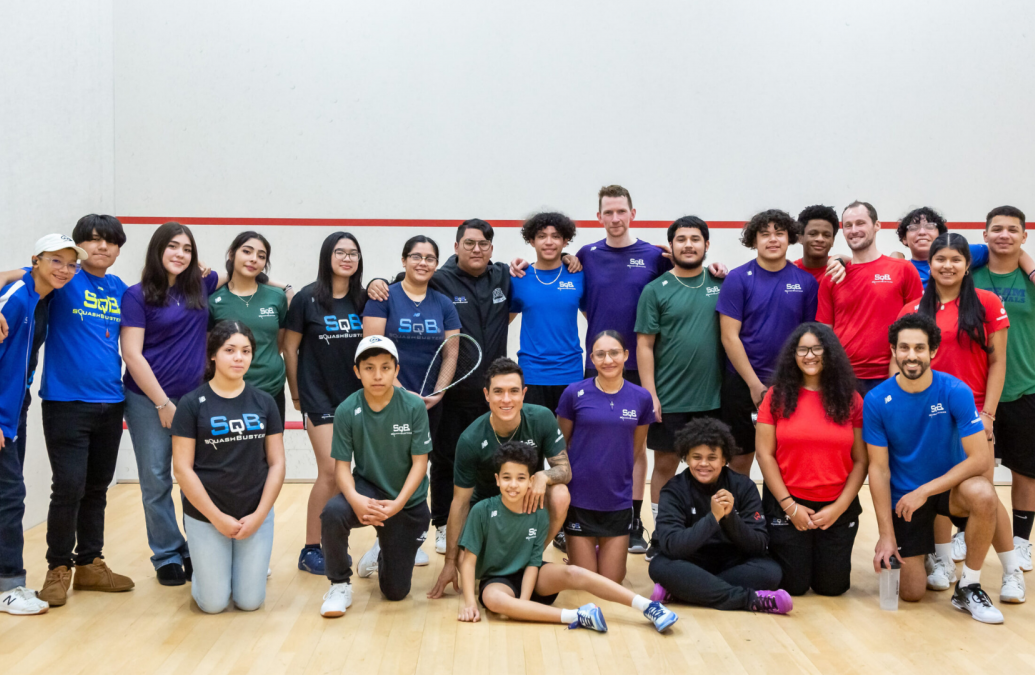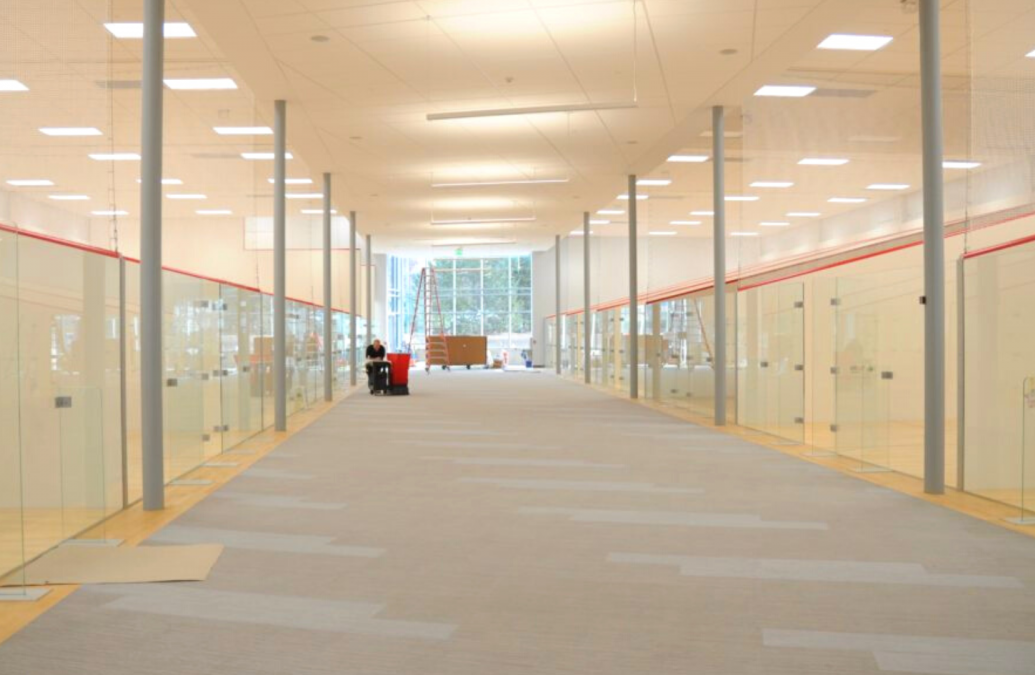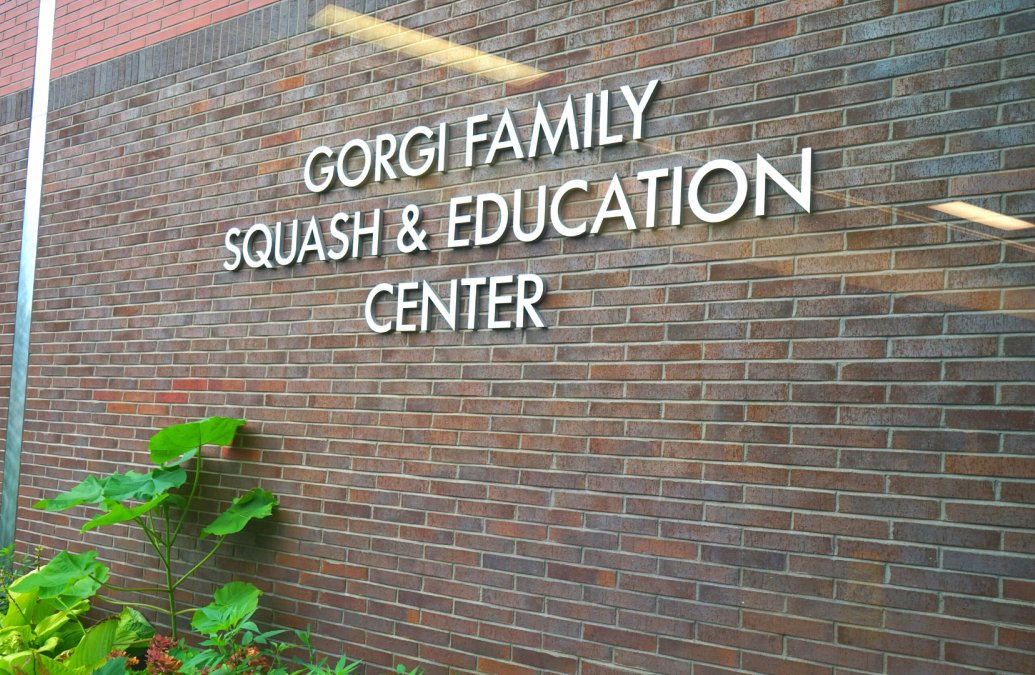Math and momentum, SquashBusters teaches students physics on and off the court

Photos courtesy of SquashBusters (SQB) Providence. SquashBusters (SQB) teams gathered to celebrate their 2023 SquashBusters Rumble, an annual fundraising event hosted by SQB Providence.


When a squash player hits the court, the physical and mental game is on, requiring agility, strategy, control and stamina. This is a driving force behind SquashBusters, a community-based organization that introduces the sport to young people in urban public schools. In 1996, founder Greg Zaff started SquashBusters (SQB) to teach students from historically marginalized communities a sport they might not otherwise have access to while offering a range of academic and social supports to help them succeed on and off the courts.
SquashBusters began with squash facilities in Boston and Lawrence, Massachusetts. It has since become a blueprint for squash programs across the United States and the world in cities such as Detroit, Oakland, Toronto, Johannesburg and here in Providence. SquashBusters founded its Providence chapter in 2017 in cooperation with the Moses Brown School. Located in the Gorgi Family Squash and Education Center on Hope Street, members of the Brown community, including professors and students, volunteer their time to support students from various Providence schools.
Students who join SquashBusters are welcomed into “one of the largest community-based squash facilities in the United States,” which includes 11 squash courts and one hardball doubles court, alongside classrooms, offices, locker rooms and a squash pro shop. In 2022, a partnership was announced between the Gorgi Squash Center and the Brown University Division of Athletics and Recreation. Alongside access to high-quality squash facilities, SquashBusters Providence provides students with academic enrichment and community engagement opportunities through a team of supportive staff and volunteers dedicated to each student’s success.
Building Community & College Preparedness
SquashBusters strives to provide an enriching learning environment across Providence public schools for middle and high school students. Bianca Camacho, SquashBusters Providence’s Academic Program Manager and a Brown alumnus, has guided and advised students for five years. In 2019, when Camacho joined, the SquashBusters program consisted of just two grades of students. Now, Camacho is assisting SquashBusters Providence’s first class of seniors in the college application process. Most high school students in the SquashBusters program attend public schools in Providence, including Classical High School, Hope High School, Central High School and The Metropolitan Regional Career And Technical Center. Camacho reflects on the SquashBusters team's support for students transitioning from middle to high school, emphasizing, “First and foremost, it's all about getting to know the student and the family and learning what the best option for them is.”
As the Academic Program Manager, Camacho is responsible for matching students with summer academic programs through SquashBusters’ partnership with the Squash Education Alliance (SEA) to give them an idea of what it’s like to study at a university. Last year, five students were nominated and awarded scholarships to attend pre-college summer programs nationwide at universities and other private institutions such as Washington University in St. Louis, the University of Rochester, The Hotchkiss School and Brown University. This year, six SquashBusters students are expected to attend pre-college programs at Brown, Carnegie Mellon, University of Michigan, UC Berkeley, Washington University in St. Louis and Choate.
Camacho notes that students “are much more ready when I talk to them about college. They know they're ready because they have had the experience of being away and they have taken college-level courses. It motivates younger students to be willing and open to those opportunities. I'm really happy that we now have our first class of seniors because the younger kids are seeing what they're working towards.”
SquashBusters schedules meeting times based on students’ grade levels. High school students meet on Mondays and Wednesdays, and middle school students meet on Tuesdays and Thursdays. On Fridays, students in the SquashBusters program participate in challenge matches and fitness stations to build their squash skills, and every year, students have multiple opportunities to play in regional and national tournaments through SEA and US Squash. Camacho added that 25 students who demonstrated scholarship and leadership were selected to play at the Squash Education Alliance’s Team Nationals in Philadelphia during this time. The programming provided by SquashBusters is made possible through the generous contributions of community members and partners at the yearly SQB Rumble. The Rumble is SquashBusters’ leading fundraising and community engagement event. It brings together the elite of the elite in the Rhode Island squash community, including Moses Brown, Brown University and the broader community. This year’s Rumble included pickleball and squash events and a professional squash exhibition.
Exploring Career Pathways
Roberto Zenit, Royce Family Professor of Teaching Excellence in Engineering, squash player and SquashBusters volunteer, believes that the initiative is vital to providing opportunities for students to learn about college and career opportunities while also learning how to play a sport.
“Most of the kids from local high schools are from historically underrepresented minority groups, mostly Latino kids and since I'm originally from Mexico, we may share similar immigrant stories,” he says. “I am interested in helping to promote science and education for everybody, so I asked the director of SquashBusters, ‘How can I help?’”
Professor Zenit also emphasizes that academic guidance is a form of educational equity for all students. He hopes that by sharing his career experience as a professor and researcher, he can normalize higher education as a possible post-secondary pathway for students in the SquashBusters program.
“Being an immigrant myself, I can relate to the challenges these students are facing or could face, in trying to go to a university. My intention is that they see me as a professor but also as a regular person who looks like them. If I was able to go to university and study engineering and be successful, they can too. Being from an underrepresented community, the issue of representation is important. I firmly believe that anybody can study engineering. These subjects and these issues are very interconnected. They're very close to my heart.”
As a SquashBusters volunteer, Professor Zenit introduces students to concepts within the study of physics and mechanics. In his lessons, he illustrates mathematical equations with elements of playing a squash game, such as position, velocity, acceleration and momentum. Professor Zenit ends his lessons by having students measure the concepts on the courts at the Gorgi Center.
“It's an excuse for me to tell them about mechanics and engineering in a playful way. Because they play squash, they become good at it by empiricism [. . .] you use the same principles to design a machine or to send an airplane to the air.”
When asked about Brown's role in supporting SquashBusters’ mission to guide students academically and socially equitably, he says anyone can help and emphasizes, “The most important resource of Brown is the students. There's an incredible amount of heart and brain at Brown, and I think Brown can help by promoting programs like this; the innate empathy of Brown students just needs to be directed.”
Giving Back to the Community
Alex Zaslavsky, Professor of Engineering and Physics at Brown who also volunteers for SquashBusters, believes the program supports young students in various ways on and off the court, including playing games, going to tournaments and receiving individual attention and support.
“I think it keeps them on an academic path,” he says. “Some of the students also become quite decent squash players. They must do their homework and attend all the extracurriculars. They must visit universities. They keep up their grades. They certainly are very appreciative and they try very hard.”
Professor Zaslavsky emphasizes volunteers' critical role in supporting community organizations and encourages Brown students to volunteer for the program.
Getting involved is easy and fun, according to SquashBusters volunteer Kate Butts '27, a Brown University sophomore and Senior Staff Writer for the Brown Daily Herald. Butts, who is passionate about promoting education access, helps SquashBusters students with homework every week.
“SquashBusters is an awesome organization to be involved in,” she says. “You form great relationships with the students even if you're not a squash player. At Brown, I take a lot of classes that deal with how race, class, gender and sexuality can inform a person's experiences and I try to keep those lessons in mind while volunteering at SquashBusters so I can meet kids where they're at. The moments when the kids and I can talk and hang out always bring a smile to my face and make me feel very connected to the SquashBusters community.”
SquashBusters provides academic opportunities and social support for students with the help of its volunteers. Click here to learn more about getting involved!
To learn more about partnering with the Swearer Center and Brown University, go to our website.
